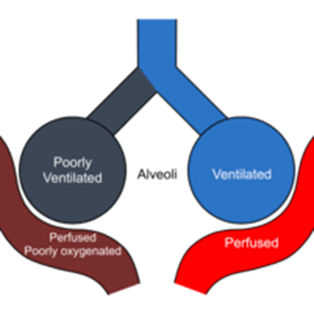Which of the following is an example of a complication that causes noncardiogenic pulmonary edema?
Diastolic dysfunction, resulting from excess sodium and water rendition
Increase in fluid in the pulmonary interstitial spaces
Kidney injury
Myocardial Ischemia
The Correct Answer is C
Nursing Test Bank
Naxlex Comprehensive Predictor Exams
Related Questions
Correct Answer is A
Explanation
Choice A Reason:
The client has no sensation or movement below the level of the injury is correct. This is a characteristic finding of a complete spinal cord injury, where there is total loss of sensory and motor function below the level of the injury. This pattern is often seen in injuries involving the cervical spinal cord, such as at the level of C7.
Choice B Reason:
The client has some movement but no sensation below the level of the injury is incorrect. This finding would be more indicative of an incomplete spinal cord injury, where there is partial preservation of sensory or motor function below the level of the injury. However, with a transection of the spinal cord at C7, it is less likely for the client to have retained movement below the level of injury.
Choice C Reason:
The client has some movement and also some sensation below the level of the injury is incorrect. This finding is not typically associated with a spinal cord injury at the level of C7. With a transection of the spinal cord at this level, there is typically complete loss of sensory and motor function below the level of the injury.
Choice D Reason:
The client has some sensation but no movement below the level of the injury is incorrect. This finding is more consistent with an incomplete spinal cord injury, where there may be partial preservation of sensory function but no motor function below the level of the injury. However, with a transection of the spinal cord at C7, it is less likely for the client to have retained sensation below the level of injury.
Correct Answer is B
Explanation
Choice A Reason:
Flail chest is incorrect. Flail chest is a condition characterized by multiple rib fractures, causing instability in the chest wall. While it can lead to respiratory distress, it doesn't directly cause ventilation-perfusion (V/Q) mismatch. Instead, it impairs the mechanics of breathing by compromising chest wall integrity.
Choice B Reason:
Emphysema is a chronic obstructive pulmonary disease (COPD) where the alveolar walls are destroyed, leading to a loss of surface area for gas exchange. This results in areas of the lungs that are well-perfused but poorly ventilated, causing a V/Q mismatch. The damage to alveoli leads to impaired ventilation, while blood flow may still be adequate, leading to hypoxemia (low oxygen levels in the blood).
Choice C Reason:
CHF primarily affects the heart’s ability to pump blood effectively, leading to pulmonary congestion and impaired gas exchange. However, it typically causes diffusion defects rather than a direct ventilation-perfusion mismatch. V/Q mismatch may occur secondary to pulmonary edema, but it’s not the primary mechanism of respiratory failure in CHF.
Choice D Reason:
Guillain-Barré syndrome is incorrect. Guillain-Barré syndrome (GBS) is a neurological disorder that affects the peripheral nervous system, leading to muscle weakness and paralysis. While respiratory muscle weakness can occur in GBS, it doesn't directly cause ventilation-perfusion (V/Q) mismatch. GBS primarily affects nerve function rather than lung function.

Whether you are a student looking to ace your exams or a practicing nurse seeking to enhance your expertise , our nursing education contents will empower you with the confidence and competence to make a difference in the lives of patients and become a respected leader in the healthcare field.
Visit Naxlex, invest in your future and unlock endless possibilities with our unparalleled nursing education contents today
Report Wrong Answer on the Current Question
Do you disagree with the answer? If yes, what is your expected answer? Explain.
Kindly be descriptive with the issue you are facing.
